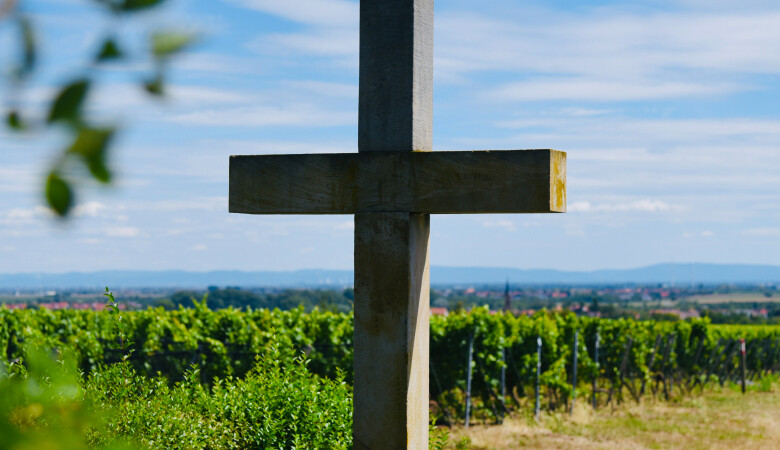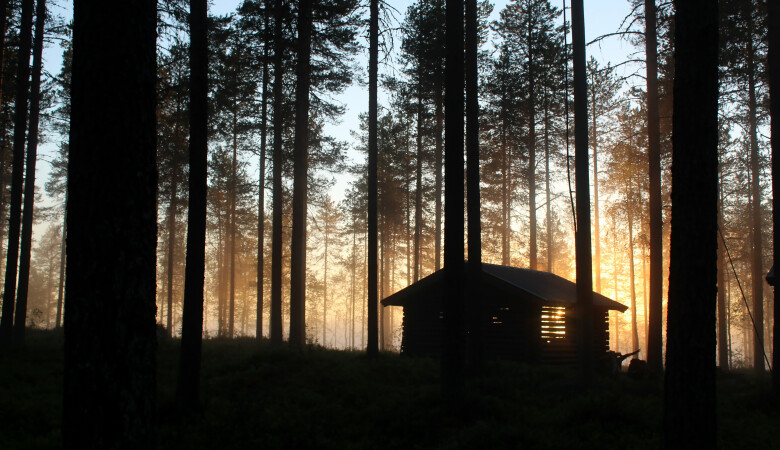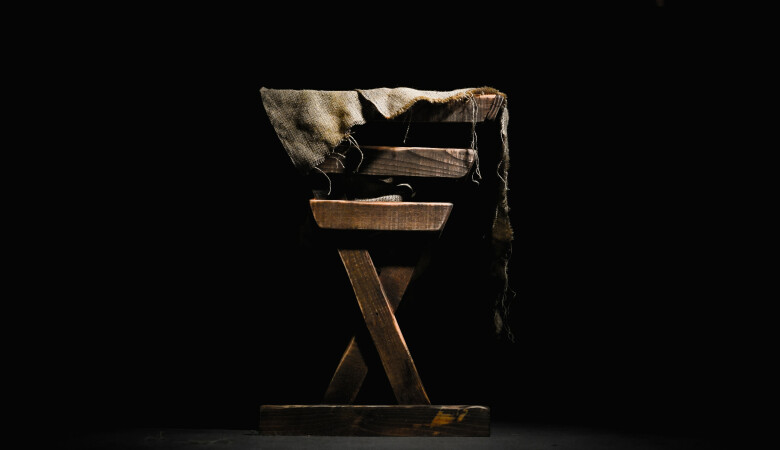The Quest for a Dwelling Place
December 19, 2010 | Andy Davis
John 1:14-18
Incarnation
sermon transcript
Introduction:
Motion in the Nativity
"The word became flesh, made his dwelling among us." What incredible riches there are, and such depth of truth in that one verse. And as we're going to look today. We are going to look across the Bible, not just focusing on John, but really from Genesis to Revelation on the issue of God's quest for a dwelling place. As I've thought about Christmas and meditated on it, and it just seems that Christmas's are coming faster and faster for me, year after year - this is my 12th Christmas message to you - and it'd just fly by. But as I think about Christmas a new and afresh, I think about the story of Christmas as a story of movement, of motion from one place to another. Of course, the ultimate movement was that of Jesus Christ in coming to the earth. He left his father's throne above, so free, so infinite his grace, emptied himself of all but love and bled for Adam's helpless race. What an infinite move that was.
But at the human level also, the story of Christmas is a story of movement, of motion from one place to another in a time when ordinarily, people might be born in one locality and not move more than 100 miles from the place where they were born their whole lives. There is actually an amazing amount of movement in the Christmas story. It begins, of course, with the edict of Caesar Augustus from the city of Rome: "that a census should be taken of the entire Roman world." And this set in motion, more people than we can possibly imagine, or calculate, or research historically. The Roman Empire was best known for its top-down authority structure and its impeccable discipline. Roman Centurion in Matthew Chapter 8 said it best in Matthew 8:9. He said, "I myself am a man under authority with soldiers under me. I tell that one 'Go' and he goes, I tell that one 'Come' and he comes. I say to my servant, 'Do this', and he does it." And so, Caesar's command set in motion a vast chain of events. He had established an incredibly elaborate courier system to communicate throughout the empire, and they took advantage of the remarkable network of Roman roads. The Empire itself covered as much as 2 million square miles, and with this one command, there shall be a census of the entire Roman world, courier sped out of Rome to all points on the compass.
Once the word reaches Palestine, King Herod had no choice, but reluctantly I think, to enforce it, knowing that to disobey Caesar would mean his own downfall. And so the command from Caesar Augustus then became a command through Herod the Great, which set the whole population of Israel in motion as well. Everyone in the Holy Land had to migrate temporarily, go back to their ancestral, their tribal home and register at that location. Now, of course, this vast movement of populations of people, of couriers, and of legions and all of that, from Spain, through Gaul, through Greece, Asia Minor, Palestine, Egypt, all over the Roman world, serves some key purposes for Caesar and for Rome: the ability to register local populations to know what kind of taxes to expect and be able to enforce those taxes, and to know where to position their legions based on population and the military needs. And so it served his purposes quite well, but you and I both know the real purpose was lodged in the mind of God, and it centered amazingly on one Jewish couple, Joseph and Mary, to move them from Nazareth to a place they ordinarily would never have presumed to go, to Bethlehem to have the birth of their son.
And so isn't it incredible how these macro events really are focused down on one little couple to achieve one end, and that is the fulfillment of prophecy - that Jesus might be identified for us as truly the son of God, the Messiah that was predicted in prophecy in Micah 5:2 it says, "But you Bethlehem Ephrathah, though you are small among the clans of Judah, out of you will come from me one who will be ruler over Israel, whose origins are from the old, from of ancient times." And so we have this roaming kind of migrating pattern going on at the time of the birth of Christ, and I think it's appropriate for the beginning of Jesus' life on Earth. When the time came, Jesus was born of a virgin, and she wrapped him in swaddling cloths and laid him in the manger because there was no room for them in the inn, as you know - and I think all of this is very appropriate because later in his life, Jesus said, "Foxes have holes and birds of the air have nests, but the son of man has no place to lay his head." And so Jesus lived his whole adult life without a dwelling place, without a place to lay his head, in some sense is homeless really. Jesus' birth, as you know, also caused some mysterious people, the Magi, to travel great distances to Palestine. We don't know how long they traveled, but it could have been weeks, it could have been months, perhaps even a year or more. We don't know where they were coming from, but they saw the star in the East, they traveled therefore West in a westerly direction. The most incredible celestial potent they'd ever seen, a movable star that eventually stopped over the house where Jesus was, something they'd never seen, these star gazers had never seen in their lives.
Now, you've all heard the Christmas Carol that is, in my opinion, rife with historical question marks and perhaps inaccuracies. We'll find out in Heaven, but we sing it anyway and well, we should. So go ahead and enjoy it, next time you sing, "We Three Kings of Orient Are: Bearing gifts we traverse afar, Field and fountain, Moor and mountain, Following yonder Star." Now, I don't know if there were three of them, and I don't think they probably were kings, but there's definitely a sense of traveling. They left their home country and came to a foreign land to see where the star led, and it led to a baby. It led to Jesus. It led to a savior, the only savior for the world.
And of course, soon after Jesus' birth, Joseph and Mary themselves had to run for their lives because wicked King Herod, disturbed by the visit of the Magi, disturbed by the prophecies concerning Jesus, wanted to kill Jesus. And so in order to eliminate one baby, he desired to kill them all, all the babies in Bethlehem and its vicinity, two years old and under. And so "an angel of the Lord appeared to Joseph in a dream and said, 'Get up and take the child and his mother and escape to Egypt. Stay there until I tell you for Herod is going to search for the child to kill him.' So he got up, took the child and his mother during the night and left for Egypt where he stayed until the death of Herod." And so Joseph and Mary were even more homeless at that point, even more roaming far from their native land, far from Nazareth, their hometown, waiting on a message from another angel that it was time to go back.
And so Jesus lived in a turbulent time with vast political forces at work, moving vast populations from place to place, and I think all of this turmoil and tumult and movement, really to some degree exemplifies the whole human race in its sin. The fact of the matter is that none of us has any permanent place here at all, not one of us. Because of sin, we are all nomads, we are just aliens and strangers, we are just passing through in a world that appears to be rather permanent, and we can settle down and it seems permanent, but it really isn't. And to some degree in an amazing way, God himself linking himself to his chosen people to us, is himself not yet settled in a permanent resting place either. He is moving, he's moving with us until his plan is finally complete. And so all of human history, all of redemptive history, in one sense you could say it comes down to a quest for a dwelling place, a place where God and man can dwell together forever and not move again. We're living in tense temporarily, we're yearning for a final dwelling place where we can live forever. And that I think is among other things, a major theme, The purpose of the Christmas story, and that's what we're going to look at today.
God’s Yearning for a Dwelling Place from Eternity
God Eternally Existing in Three Persons
Now, I'm not going to be doing a careful exposition of John 1, 14-18, though it'd be well worth doing, but I just want to trace out this theme that centers in Verse 14, where it says, "The word became flesh and made his dwelling among us." I want to zero in on that issue of dwelling and I want to trace it out over biblical history and then look a little more carefully at Romans, Romans 1 and Verse 14. And so we see God biblically yearning for a dwelling place from eternity past. Before the universe even began, God had a desire to dwell with humanity, with holy humanity in fellowship that's patterned after his own fellowship within the Trinity, right from the beginning of our text today, John 1:1, "In the beginning was the word, and the word was with God, and the word was God." And so there's this fellowship between persons of the Trinity, the father and the son in fellowship together. The word was with God and God eternally existing in three persons, perfect in love, perfect in fellowship and communication, in relationship and intimacy. There was no lack at all in the Trinity, but only fullness, and God yearned out of love to pour out that fullness on created beings that they might share that kind of unity and fellowship with him and with each other that he shares within himself and the Trinity. And so not out of lack did he create, but out of fullness in love he created the universe.
God Created Man in His Image for Relationship
"In the beginning, God created the heavens and the Earth," and so he created as a culmination of all that, man in his own image for a perfect intimacy with him. "God created man in his own image, in the image of God; he created him male and female, created them," and I think at least part of that image is the ability to have a relationship with God and with each other in perfect unity. And so God had a desire to settle down with us and to dwell with us in that perfect unity from before the foundation of the world.
God’s Desire before the Foundation of the World: To Dwell with Man in Perfect Fellowship
So Romans 8:29 and 30 says, "For those God foreknew he also predestined to be conformed to the likeness of his Son, that he might be the firstborn among many brothers. And those he predestined, he also called; those he called, he also justified; those he justified, he also glorified." That glorification is the perfection of fellowship between God and holy humanity. So before the foundation of the world, God had a vision for this. That's what he wanted to do.
God’s Quest for a Dwelling Place in History
In Eden: A Perfect Dwelling Place on Probation
But then once history started to unfold, then you see God's quest for a permanent dwelling place in history unfolding. Of course, God set up a beautiful garden, Eden, perfect on the face of the Earth, the perfect place for mankind to begin. And God placed the man there originally alone, and he communicated with him and gave him a sense of his freedoms and his responsibilities there, "You're free to eat from any tree in the garden, but you must not eat from the tree of the knowledge of good and evil. But when you eat of it, you will surely die." And so therefore, this perfect garden, this original dwelling place where sinless or holy man could dwell together in fellowship with God was merely a place of probation. They were being tested, they were on probation. It wasn't permanent. And you have a sense of the kind of relationship that man had with God over in Genesis 3, "When they hear the sound of the Lord God walking in the garden in the cool of the day," it says, "And they were afraid and they hid." You remember? And so if you just go back with that and say, "Well, then they must have recognized the sound of God, the communication, the fellowship they had." They knew it was him, they were having a relationship with God, but I say to you is merely probationary.
The Fall: Dwelling Place Cut Off
They were being tested. God knew before the foundation of the world they would fail that test and a redeemer would be needed. And so it's so very tragic as they fell into sin, they eat from the tree of the knowledge of good and evil, and they were evicted from the Garden of Eden, and thus the quest for a permanent dwelling place began in earnest. And it's amazing how the word dwelling or remaining or settling, I'll talk about that later in the message, but it first appears in Genesis 3:24, where it says that he drove man out. "He drove the man out and at the East of the Garden of Eden, he stationed," that's the same Hebrew word, he settled down a "cherubim in a flaming sword, which turned in every direction to guard the way to the tree of life." Isn't that tragic? That's the settling down that happened as a result of man's sin, in effect God stationing death between us and the tree of life, and to me, the tree of life is the dwelling place. That's where we get to live with God forever. And so this infinite gap, this tragic gap came between us and God because of sin. The entire human race on the outside evicted from the fellowship, that place of dwelling with God.
The Patriarchs: Walking with God by Faith but not Yet Dwelling with Him
And so God began redemptive history. He began winning the human race back to himself in Christ. The patriarchs, it says of Enoch that he "walked with God" and "God took him," and so by faith, this man had a relationship with God. And Noah, it's also said of Noah that he "walked with God," and there's a sense of fellowship there, isn't there, but also a sense of journeying. They're not finally settled down here on Earth, they're having to move. And so they walk with God because they can't stay in this one place, and they have to move on.
God called Abraham out of Ur the Chaldees, and he moved him over to this land, the Promised Land, it became known, and because God made him a promise and it was a promise of a future dwelling place where he could settle down forever. So God said to Abraham in Genesis 17:8, he said, "The whole land of Canaan, where you are now an alien, I will give as an everlasting possession to you and your descendants after you; and I will be their God." Now notice that God called Abraham an alien. That means someone with no lasting dwelling place, no place to lay his head really; to some degree, that was Abraham in the Promised Land. Abraham was called God's friend. There was nothing lacking in their relationship. Abraham walked with God by faith, but he lived in a tent, and he was sitting at the door of the tent when the angel of the Lord and two other angels showed up. Remember how it says in Hebrews that some have entertained angels without knowing it? I think that's at least talking about Abraham there. And he got up and he went into the tent and he told Sara to prepare some food and all that, but he's living in a tent, he's entertaining the Lord at the doorway through his tent.
Isaac and Jacob also lived in tents. Jacob eventually left the Promised Land under the pressure of the famine and went and lived in Egypt to come under the protection of his son Joseph who was second only to Pharaoh there in Egypt. And at the end of his life, "Jacob said to Pharaoh, he said, 'The years of my pilgrimage are 130. My years have been few and difficult, and they do not equal the years of the pilgrimage of my fathers.'"
It's an interesting expression, pilgrimage. We don't use it much, but it has a sense of a journey for religious reasons. You're going to a shrine or a temple or some place, and you're trying to get there and there you're going to offer some worship. Now, we saw Shinto and Buddhist pilgrims in Shikoku, and they went to these 88 different shrines and they were going from place to place on this pilgrimage for pagan religion and idolatrous religion, but it's a pilgrimage. So also in the Middle Ages, they used to go on pilgrimage, is going from place to place. This is the language that Jacob used for his life, and he says, "It's been short. It's only been 130 years, and it doesn't equal the years of my father. He made it to 176." And so death is just looming over this pilgrimage and it seems to be shortening it, and it's a sense of: we're not there yet, we haven't come into our dwelling place yet, we're yearning for home. And so the author to Hebrews picks up on Abraham, Isaac, and Jacob, and I think Enoch and Noah as well, and the others that he's mentioned. In Hebrews 11 up to that point he says, "All of these people were still living by faith when they died. They did not receive the things promised, but only saw them and welcomed them from a distance, and they admitted that they were aliens and strangers on earth. People who say such things, they're showing that they're thinking of a country of their own. If they'd been thinking of the country they had left, they would have had an opportunity to go back. Instead, they were longing for a better country, a heavenly one, and therefore God is not ashamed to be called their God for he has prepared a city for them." For the purpose of my sermon, I'll just say he has prepared a dwelling place for them, where they can live with him forever and ever. They died without coming into it; they were aliens and strangers in this world.
The Jews: God’s Chosen People and God’s Desire to Dwell with Them
In the course of time, God chose the descendants of Abraham, who we know as the Jews, his chosen people, and expressed to them his desire to dwell with them. But they were slaves in Egypt for 400 years, and he called them out of bondage to be his own, his treasured possession. And it says in Exodus 29, "I will dwell among the Israelites and be their God, and they will know that I am the Lord their God who brought them out of Egypt so that I might dwell among them. I am the Lord their God." He says "Dwell" twice there. He wants to live with his people, his chosen people. And so he moved them out from Egypt. In Egypt, they had no dwelling place, they couldn't own any property, there was nothing there for them. They were just slaves there doing the bidding of another, and God had a place for them where they could dwell. And so he says in Leviticus 26, "I will put my dwelling place among you and I will not abhor you." That's encouraging, isn't it? I'm so glad to not be abhorred by God. What a delight it is that God doesn't hate me. But you know the thing is, God hates evil, and what God is saying is: I will separate you from your evil and I will love you, and the evil about you I hate I will cast into the sea and you'll see it no more. He says I'm going to dwell among you and I'll not abhor you, and I will walk among you and be your God and you will be my people. That's even language. He says I want to live with you, and I want to dwell with you forever. So the Exodus was a picture of the desire that God had to give them a home, an eternal home, not in this present earthly age so ravaged by sin.
The Exodus literally means departure. I remember, I was on a mission trip in Greece, and I was in a room there and I can read Greek, and so over the door, there it was, right over the door, it said 'Exodus'. And I was like, "Wow, it's biblical. Right here in this room. There it is, there's the Exodus." Just means 'way out'. And so that was what it was, God was bringing them out of bondage. But the way gives you a sense of a journey doesn't it. A departure and a movement, there is a sense of a journeying that has to travel, and you know how it went with the Jews because of their unbelief. Because of sin, you know it lasted for 40 years out in the desert, and there was no permanent dwelling place in the desert. It was not meant to be so. That's not the land that God was giving them. And so God himself moved about from place to place for those 40 years in the form of a pillar of cloud and a pillar of fire, and so God is there journeying with his people, going from place to place. Sometimes they might spend only a night, sometimes they might be there for a year or more, moving from place to place. Exodus 13, it says, "By day, the Lord went ahead of them in a pillar of cloud to guide them on their way, and by night, in a pillar of fire to give them light, so they could travel by day or night, neither the pillar of cloud by day nor the pillar of fire by night left its place in front of the people."
Now, I think, if any human being at that time felt this restless roaming and wandering, it had to be Moses. More than anyone else, I think he felt it. Look at his life. He was born eventually into privilege, once he was taken into Pharaoh's home by Pharaoh's daughter, he was raised in privilege, powerful in speech and action, wealthy, a good life ahead of him. But I think, at some point, he came to understand his heritage, and he knew that he was Jewish, and he understood what was happening to his own people and how they were being mistreated. And he identified with them, and he saw one of them being mistreated by an Egyptian master, being beaten, and so he came to his aid and killed that overseer, buried him and hid him in the sand. And when Pharaoh heard about him, he tried to kill Moses, but Moses ran for his life, and that began openly, a life of homeless wandering that continued to the end of his days. He eventually settles in the tent of Jethro, his father-in-law. He was a good father-in-law, but he's still a father-in-law, dear friends. You know what I'm talking about.
And he was still living in Jethro's tent at 80 years old. They lived a long time back then. Jethro is still there, and there's Moses as a son-in-law, at age 80, tending his father-in-law's sheep. How would you like that to be your life calling? I'm tending my father-in-law's sheep. How are they doing? They're doing very well, thank you. Wouldn't you like sheep of your own? Well, he's about to get sheep of his own, but they're just not sheep, they're are going to be people, two million strong. And the Lord called him in the flames of the burning bush, and he went and he led the people out, and through their unbelief, they refused to enter the Promised Land, spoke of stoning Moses and thus began 40 more years of homeless wandering for this man of God. And provoked by their wickedness, at one point, he sinned against God and did not consider God holy, but disobeyed God and struck the rock a second time, so speaking to it, and God forbid him from entering the Promised Land. And though he begged him, he said, "I want to see that good land. Won't you let me go over and see the good land?" He didn't ever say, "After all I've done for you." He knew that that would not even hold any candle or water with God at all, he didn't even say that, "But just out of your grace, out of your mercy, would you not let me go over and see that good land?" And God said, "Stop talking to me about it. I will not hear any more prayer about this. But I'll let you go up on Mount Pisgah, and you can see it from there, from afar, you can see it from a distance. But I will not let you enter it." And so this man of God, at some point, I think, in those wanderings in the 40 years, plenty of time to write, sat down and wrote Psalm 90, where it says in Verse 1, "Lord, You have been our dwelling place from generation to generation." I don't have any other dwelling place here, it's just you, God. A yearning to dwell with God. And in the midst of that time, God revealed to Moses, at a deeper level than had ever been revealed up to that point, his desire to dwell with his people.
The Tabernacle: The Symbolic Dwelling Place of God with His People
He took him up on the mountain of God, and there he showed him a vision of a tabernacle. And this tabernacle was a symbol or representation of God's desire, his eternal desire, before the foundation of the world, his desire to dwell with his people. And he commanded him again and again and again, "Make everything according to the pattern I have shown you. Make it exactly like the pattern," and so out came the tabernacle. And it says that he did, he made it exactly like the pattern. Book of Hebrews tells us it's just a copy and a shadow of the heavenly reality. What is the heavenly reality? It's not so much that there's a tabernacle in heaven, it's that God dwells with his people in heaven. That's the reality, the tabernacle then a symbol of it. What was the Tabernacle? It was a tent. That's all it was. It was just a tent, a movable tent. God told the purpose, in Exodus 25, 8 and 9, "Have them make a sanctuary for me, and I will dwell among them. Make this tabernacle and all of its furnishings exactly like the pattern I will show you." And again, Exodus 29, 42-46, "There at the tent meeting, I will meet you and I will speak to you, and there also, I will meet with the Israelites and the place will be consecrated by my glory, and so I will consecrate the tent of meeting and the altar and will consecrate Aaron and his sons to serve me as priests. Then," listen to this, "I will dwell among the Israelites and be their God, and they will know that I am the Lord their God who brought them out of Egypt, so that I might dwell among them. I am the Lord their God." That was the reason for the tabernacle, so that God could in a very visible way, dwell with his people and live with them. Now, God's commands for the tabernacle, very, very earthy, very rooted in the earth. You get linen, plants that are growing up, and then you get these linen fibers that are going to be made into curtains, and you get acacia wood that's growing up out of the dust of the earth, and you've got precious metals and you've got metal for the stands and the rings, and you've got animal skins, and then the hides of the dugong. You have to look up a dugong. What is a dugong? Some say it's a sea cow. That doesn't help. What is a sea cow? Porpoise? Some kind of sea creature that would have been good for keeping water off, and they use that as a covering. Very, very earthy thing. I wonder what it would have smelled like. The tabernacle, however, was plainly intended to be movable. It could be disassembled and it could be carried, and so a certain group or sub-sect of the Levites were designed or called on by God, to carry the tabernacle. It moved from place to place.
And always, what made it special was the Shekinah glory of God. And I've told you before in other sermons, I didn't know what the word, Shekinah, meant. I just heard it all the time, Shekinah glory. I thought that the Pentecostals invented it. I couldn't find it anywhere in the Bible. But they didn't invent it, it really is just a transliteration of the word, dwelling place. So the mishkan, in the Hebrew, the prefix, the M, is a participle, it's a dwelling place. It's the mishkan or Shekinah is the dwelling place. Shekinah glory is the dwelling glory of God, and it came and said, "I will dwell with you here, the tabernacle's the place, the mishkan is the place of dwelling where God will dwell with his people." And so God's glory, the glory cloud, entered the tabernacle and abided on it as a constant reminder of God's desire to dwell with his people. Exodus 40, "Then the cloud covered the tent of meeting, and the glory of the Lord filled the tabernacle, and Moses could not enter the tent of meeting because the cloud had settled upon it and the glory of the Lord filled the tabernacle." Do you see the tension there in the old covenant?
The law came by Moses, grace and truth came by Jesus. There's this glory, and Moses can't enter. I thought the point was that, we could enter, that we could go right into the glory. We're getting there, friends, we'll get there eventually in the sermon, some time, somewhere around 1 o'clock. But at any rate, there's going to be this time of entering the glory, but Moses couldn't enter yet. And in the same passage, the glory cloud gives a sense that the journey was not yet finished, for God still had to travel with his people to reach their dwelling place. In Verse 36 and following, Exodus 40, "In all the travels of the Israelites, whenever the cloud lifted from above the tabernacle, they would set out. But if the cloud did not lift, they did not set out until the day lifted. So the cloud of the Lord was over the tabernacle by day, and fire was in the cloud by night, in the sight of all the house of Israel during all their travels." God's at move, on the move, and so in Daniel 7, God's throne is pictured as having wheels. In Ezekiel, there's a sense of wheels of movement. God hasn't come home yet. And so, at one point in the Pentateuch, they say, "Arise O Lord and come into your dwelling".
And so they want God to come back and settle down in his dwelling. And the tabernacle was equally accessible and inaccessible. Equally accessible in that it was right in the middle of the camp and all the tribes set up camp around, in numbers two. God described very plainly, where everyone's to set up shop and they all get to be close, but none of them gets to come in. None of them. Not even Aaron, except once a year, with blood, on the day of atonement. In Leviticus 16, God said, "You tell your brother, Aaron, he is not to come any time he chooses, into the holy place. Most Holy Place." Oh, that's a message, isn't it? You are not ready to dwell with me yet, and I'm not ready to have you dwell with me yet. The Book of Hebrews makes it plain, that the tabernacle itself showed that the way hadn't been opened yet, not yet. And so it says in Hebrews 9:8, "The Holy Spirit was showing by this, that the way into the most holy place had not yet been disclosed as long as the first tabernacle was still standing." Now, once they entered the Promised Land, God ordained that they choose one location from all of the 12 tribes, and they were not to be like the Canaanites who worship wherever they wanted under every spreading tree and on every high place. No, they weren't allowed to do that. They had to all migrate within the Promised Land three times a year and come to the one location. What is God telling them there? Even in the Promised Land, there's still aliens and strangers, to some degree, there's still a journey to be made.
The Temple: The Picture of Permanence, But Not Yet Achieved
And God stayed in his tent until David had a bright idea. Remember that? David saying, "Here I am, in a palace of cedar…" and there's God "in a tent," let's build him something - what's the word? Permanent. Let's make something permanent. That's what I want to do. This is a great home, God's blessed me. Nathan said, just because he was friends with David, "Whatever you want to do, do it. Sounds good." Then God spoke a better word to Nathan later on. He said, "Go back and tell David this. This is what the Lord Almighty says. Are you the one to build a house for me?" What a humbling question that is. "I have someone better in mind. My son is going to build the house, and yours." He says, "I have not dwelt in a house from the day I brought the Israelites up out of Egypt, to this day. I have been moving," listen to this language. This is God speaking, "I have been moving from place to place, with a tent as my dwelling." That's an amazing thing for God to say. I have been living in a tent. "Wherever I have moved with all the Israelites, did I ever say to the rulers of the people, that I commanded to shepherd my people of Israel, 'Why have you not built me a house of cedar?'" It's amazing how God humbles you very lowly and then raises you up.
He says, "Look, I'm going to raise a son out of your own body, and he's the one who will build a house for me." And he didn't mean Solomon. Now, Solomon dill did build, and I think, with the blessing of God, a more permanent location for them to worship. It was called the temple. But that became a stumbling stone for the Jews. They misunderstood, they really did think it was permanent. They really think God had arrived at last: Now, we have this big impressive building with these massive stones, and we have finally settled in. God will never ever let anything happen to his temple. And so they used to say in the days of Jeremiah, "The temple of the Lord, the temple of the Lord, the temple of the Lord." God had a lesson from them. When God destroyed Solomon's temple by the Babylonians, what was he saying? I have not come home yet, and neither have you. And when he scattered them to the four corners of the Earth, when they went in exile to Babylon and other places, when they were scattered, he was saying, you have not yet entered your dwelling place. You are aliens and strangers in this world, sent them into exile. And even in the days of Jesus, his Disciples still didn't get it. Remember how they were coming out of the temple grounds and looking at Herod's temple at that point. And they were saying, "Teacher, what massive stones. What impressive buildings." And Jesus said, You haven't learned the lesson, have you. "I tell you, not one stone here will be left on another. Every one will be thrown down." There is no permanent dwelling place here on earth, in this present age. It says in 2 Corinthians 4:18, "So we fix our eyes not on what is seen, but on what is unseen. For what is seen is temporary, but what is unseen is eternal."
God’s Commitment to a Dwelling Place in Christ
The Eternal Deity of Christ as the “Word” of God: Verse 1
Alright. So, does God want to have a dwelling place? Yes, he does. How do we know that? Because Jesus was born. That is how we know God wants to have a dwelling place with us. The deity of Christ established in Verse 1, this is God, "In the beginning was the Word, and the Word was with God, and the Word was God." Jesus is the Word; Jesus is God, clear deity.
The Shocking Statement of the Incarnation: The Word Became “Flesh”
And then in Verse 14, "The word became flesh and made his dwelling among us, and we have seen his glory. Glory of the only Begotten, from the Father, full of grace and truth." Now, the word became flesh is a shocking expression, and John, the Apostle John meant it to be so. He wrote in Greek; there's Greek thought swirling around there, Greek philosophy and Greek mentality - the senses that the physical is the low, animal aspect of humanity. We've got to get up into the ethereal, non-physical realms, you see. Because the physical is wicked and evil, and we have to become pure spirits. Some Christian theologians picked up on this and said, Jesus actually only seemed to have been human. John basically takes the human race and has a stare at the flesh of Jesus. And so he uses this word, flesh, and it's very strong, a sense of sinews and capillaries, and blood vessels and tendons, muscles and intestines and skin. The flesh of Jesus. The Apostle John is fighting against the view that Jesus wasn't truly human. He was truly human. He could have said, "The word became human," and that would have been true, but he goes beyond that and said, "The word became flesh." And Jesus' flesh was knit together by the Holy Spirit inside the womb of his mother, Mary, and he was born in the ordinary way, like any other baby, but unlike any other baby, because he had no human father. Luke 2, 7, "She gave birth in an ordinary way to her firstborn son and wrapped him in cloths and placed him in a manger, because there was no room for them in the inn.” Jesus' human body was prepared for him by God, so that he could die on the cross as an atoning sacrifice for our sins, and his body, his flesh was wrapped up in swaddling clothes, by his mother, at the beginning of his life, a symbol of his frailty. And isn't it amazing how at the end of his life, it's wrapped up again, in cloths, a symbol of his frailty now consummated in his death. As Joseph of Arimathea, Nicodemus wrap him up and prepare him for burial. He came into the world as a human being, frail and weak.
Jesus “Made His Dwelling among Us”
And it says, he made his dwelling among us. The Apostle John, clearly, I believe with all my heart, connecting back to the tabernacle language, some say pitched his tent or was the tabernacle of God among us. He was, he is the tabernacle. Jesus' body is presented then as the new dwelling place where the glory of God is clearly visible and where the people of God can meet him and dwell with him, and his disciples could behold his glory, and it would be a glory apparent only to those with the eyes of faith. We have seen his glory, the glory of the only begotten from the Father. He's the only one like him, and there's no one else like him in the universe. And it says, "Full of grace and truth." Oh, how sweet are those words, for us. Amen. Full of grace, that's Jesus. Jesus didn't merely present grace or truth or discuss them, or believe in them, or exemplify them or - and those words are too far removed from Jesus. He was grace, he was truth, he is grace, and is truth, and he's full of grace and full of - some people are conduits of grace and truth. Amen. I want to be that. In my life, I'd like to be a pipeline of grace and truth. Jesus is no pipeline; he is grace and truth. He's the reservoir of grace and truth. And what is grace? It's God's sovereign determination to do us, wicked sinners, good. Later in the same section, look at Verse 17, "The law came by Moses." What does the law do for you and me? I know what it will do for you and me. It will send us to hell. That's what the law does. The law will condemn me because we cannot keep it. We are idolaters, we are covetous people, we are adulterers, we are liars, we have worshipped other "gods," we have not honored our parents; the law condemns us, friends, but "grace and truth comes by Jesus Christ." And how sweet is that? It is the grace of God to save sinners like us.
John’s Witness: Eternity Steps into Time
And John testified in Verse 15, both the Apostle John in writing John the Baptist' testimony, and John the Baptist himself in giving this testimony, "He testified concerning..." Now, do you know who John the Baptist was? He was Jesus' relative, born; it seems like about six months before Jesus, began his ministry a number of years before Jesus began his public ministry, very famous, well-known, everyone in Judea going out, hearing his bold preaching, his unusual lifestyle, his odd practice of baptizing Jews, and just an amazing famous man. And he sees this man who's younger than him and who hasn't done anything yet in ministry, and he says, "He who was after me actually is before me and has surpassed me because he was before me." He takes a higher rank because he pre-existed me, or how does that work, John? Well, before Jesus even uttered these words, John the Baptist understood them. What Jesus said to his enemies, "Your father, Abraham, rejoiced at the thought of seeing my day, he sought and was glad." Jesus' enemy said, "You're not even 50 years old and you've seen Abraham?" He lived 2000 years before Jesus. And Jesus said, "I tell you the truth, before Abraham was born, I am." John the Baptist understood that he was before me. He existed before me. There has never been a time he didn't exist. And John the Baptist also knew what Jesus came to do, how he was full of grace and truth. When the next day, he pointed to Jesus and said, "Behold the Lamb of God who takes away the sin of the world," that's how he's full of grace and truth. That tabernacle was a place of animal sacrifice, that was the center of the meeting, and God saying, "There is only one way to get to me and that's by shedding of blood, by death." That's what the sword flashing back and forth in Eden is all about. You must die. There's a death penalty to be paid. And then that death penalty transferred to Jesus, and he is the Lamb of God who dies for the sins of the world.
The Gifts that Flowed from Jesus: Fullness of Grace
And what gifts flow from Jesus? Look at Verse 16, "From his fullness, we have all received grace upon grace." I love that expression, that translation, "Grace upon grace." Now, every year, billions of dollars are spent on Christmas gifts. Perhaps you've spent billions of dollars on Christmas gifts. I hope not. But the estimate - I don't know how they even estimate these things. Every purchase made in December is a Christmas gift? I don't think so. How do they do it? I don't know. Because odd things are bought at Christmas time as gifts, so I don't know how they unravel it and say - but they're saying something like half a trillion dollars. Think about that, half a trillion dollars spent on Christmas gifts. That's an awful lot of money. Now, think back at your own heritage and history of Christmas. How would you feel if by the sovereign grace of God, you could see all of the Christmas gifts you've ever received in one place, in brand new condition right now. All in one place. That tricycle you were so excited to get when you were four, that - I had a cap gun set when I was a rooting tooting cowboy, I remember, when I was six or seven, something like that. House was filled with the smell of gunpowder or whatever, those little caps. You remember that? We used to smash them with a rock and all kinds of things. We did all kinds of fun things. But the stuff you can't wait to have. You know how the ad campaigns, they stimulate in the children, the gut to have things, and you know how almost every year, it seems there's the single gift that everyone has to have, and they're always on the verge of running out of it. And people stand up in line, and it's 20% more money because there's supply and demand. And you have all these gifts that you've had across your life, and you outgrow them or they break or they float out of your life. And one gift follows another, which follows another. Well, this Verse talks about a better sequence of gifts.
Grace, literally, it's grace instead of grace, or grace after grace. And so what God has in mind is a whole treatment of grace for you and me. Like at a spa, we need a whole series of grace treatments, and it's going to be grace upon grace upon grace, until we're at last, in the dwelling place with God in heaven. Converting grace. If you're lost, you need a savior, you need the grace of God to convert you. I plead with you, friend, be converted. Look to Christ. See Jesus now on the cross. I know we're focusing on Christmas, but focus for a moment on Good Friday, Jesus' death on the cross and on Easter. Picture him there, his blood shed, picture him buried in the tomb. Picture him raised from the dead on the third day and say, "That is my savior. I need you, Jesus." Trust in him. And if you do, you have received grace, converting grace. But that won't be the end of the grace you need, then you need sanctifying grace to come in, you need a whole life change. God wants to transform you and make you ready to dwell with him forever, and so he's changing your life, and you need converting grace and sanctifying grace. And you need instructing grace, that God would teach you many things from his word and you'd be transformed by the renewing of your mind. And persevering grace, and sustaining grace. When you're going through trials, bitter trials, facing your own flesh and its weakness. You're struggling with loneliness and other temptations, you need sustaining grace for years and years, because only those who finish really began. And God knows that better than you do, and so he who began a good work in you will sustain it and keep it going until the end. And from his fullness, we have all received grace after grace, after grace, after grace. And then finally, dying grace, that you would maintain your testimony through to the end, and then glorifying grace.
The Final Goal: Perfect Intimacy with God through Christ
And at last you'll be home, at last you'll be home with Jesus. That is the final goal. Verse 18 says, "No one has ever seen God at any time, but the only begotten God who is in the bosom of the Father, He has explained Him" - isn't it interesting how Jesus said he had no place to lay his head? You know why? Because here's where he wants to lay his head, on the father's bosom. That's his home. And isn't it beautiful how at the end of John's gospel, John puts his head on Jesus' chest. He says, "Lord," who is it, "who's going to betray you?" Remember that picture, the word bosom then appears twice in the Greek, both at beginning and end of the Gospel. And so there's this picture of Jesus laying his head on the Father, and John, the Apostle John, laying his head on Jesus. That's your home, friends.
God’s Consummation of a Dwelling Place in Heaven
Christians Here in this World: Aliens and Strangers in a Temporary Tent
When we're up there in heaven, that's your home. That's where we're going. And so the consummation of the dwelling place is in heaven. We're not home yet. Do you know that? Do you know that you're dwelling, the scripture says, in a tent of a body? It's a tent, and it's getting more voluminous by the day, you're thinking, especially in December. It's a tent. Peter called it a tent, he said, "I will soon lay aside the tent of this body, the Lord Jesus has made this plain to me," He calls it a tent. 2nd Corinthians Chapter 5, the apostle Paul says, "Now we know that if the earthly tent we live in is destroyed, we have a building from God. An eternal house in heaven, not built by human hands. And meanwhile, we groan, longing to be clothed with our heavenly dwelling, because when we are clothed, we will not be found naked." So we're waiting for our heavenly dwelling place.
The Essence & Consummation of Faith: Looking Ahead to a Future City – A New Jerusalem
And so, Revelation 21 tells us what it will be. "Then I saw a new heaven and a new earth, for the first heaven and the first earth had passed away, and there was no longer any sea. And I saw the holy city, the new Jerusalem, coming down out of heaven from God, prepared as a bride beautifully dressed for her husband. And I heard a loud voice from the throne saying, now, this is literal, 'Now is the tabernacle of God with men…'" That's literally the translation. Finally, the tabernacle shows up in eternity. "'Now is the dwelling place of God with men, and he will live with them, and they will be his people, and God himself will be with them and be their God. And he will wipe every tear from your eyes, and there'll be no more death or mourning or crying or pain...'" Why? Because "…the old order of things has passed away." and God has made everything new. That is a full history of the dwelling place.
Applications & Closing Prayer
Aliens and Strangers: Understand the Impermanence of Life in this World
So Christmas morning is coming soon, you sit down to open up your gifts, what does this have to do with that? Everything you open up is temporary, everything. And you know it well, don't you? Maybe the little kids don't know it yet, but they'll learn. It's all temporary. While you do it, say, "This is not my home. I'm an alien here, a stranger just passing through." Invest in your mind, in your eternal resting place in heaven.
Meditate much on it. Tell yourself, "I'm an alien and a stranger here." Tell yourself that Jesus is your dwelling place. He has pitched his tent or made his tabernacle in the center of your life. Live with him, dwell with him. Don't focus on earthly things, don't be troubled by the busyness of the season. Ask God to give you grace and energy, and do it with grace and dignity. Go through it with energy, but just know we are just passing through here and it will not be very long before we dwell with God in Heaven. Close with me in prayer.
Father, thank you for the richness of this theme in the Bible, so much we could say. Father, I pray that we would understand the fullness of John 1:14, "that the word became flesh" and made his tabernacle or tabernacled with, pitched his tent with us. And that we would not be so rooted in earthly things that we forget our heavenly calling to live with you forever. I pray that we'd be pure and holy and not defiled by this earthly system. We thank you for these things in Jesus name. Amen.






























